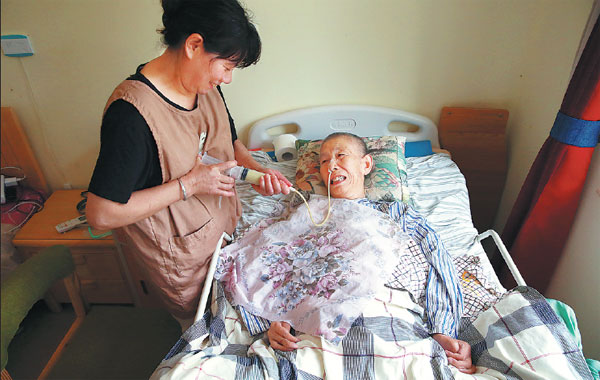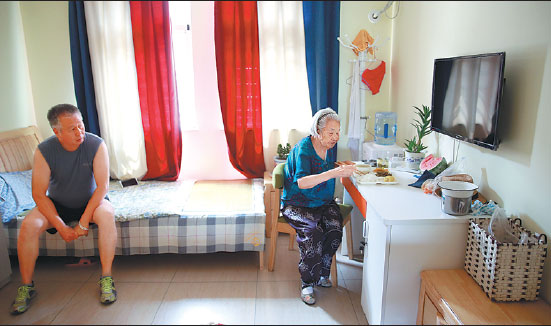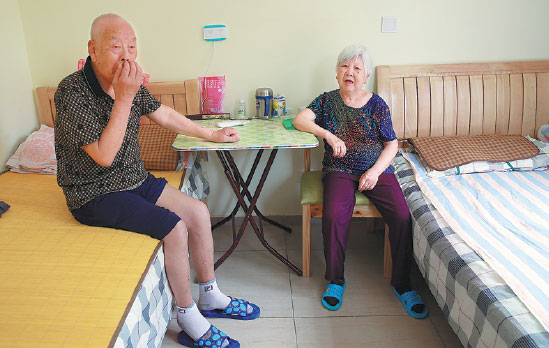Government plans insurance program for disabled seniors
Updated: 2016-08-10 14:41
By Shan Juan(China Daily USA)
|
||||||||
As family sizes shrink and China's population ages, the country will have to expend more resources and money to provide elderly citizens with everyday assistance. Shan Juan reports.
Editor's note: This is the first in a series of reports China Daily will publish looking at the lives of elderly people, the problems they face and ongoing efforts to improve their standards of living.
When China introduced the one-child family planning policy more than 35 years ago, elderly people, who traditionally relied on their children for care, were told to look to the State to provide support.
The policy was intended to reduce family sizes and people's reliance on their children, so there would no longer be any point in having a large family, especially many sons. The story didn't unfold as expected though, especially for the large number of disabled elderly people and their struggling families.
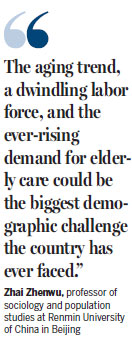
Du Ping, a resident of the Jianye district of Nanjing, capital of East China's Jiangsu province, has become increasingly frustrated after many failed attempts to hire a long-term qualified care worker for his 73-year-old father.
The elderly man was diagnosed with dementia in 2014 and is also paralyzed and incontinent, so he is dependent on other people.
"We've hired more than 10 caregivers since then. None of them lasted long, despite the above-average pay," Du said. "Many refused when they discovered their patient was a disabled senior."
Du resumed his search two weeks ago, when the most-recent caregiver quit, even though her monthly salary was 5,000 yuan ($750), almost twice the average wage of 3,000 yuan.
"It's a considerable sum, almost half of our (he and his wife) combined income," he said. "It would cost even more if we placed my father in a nursing home."
Aging population
Du's story is not unusual. By the end of last year, there were 222 million people age 60 and older in China, and about 4.5 million of them had severe disabilities that required long-term assistance, according to the National Health and Family Planning Commission.
"The aging trend, a dwindling labor force, and the ever-rising demand for elderly care could be the biggest demographic challenge the country has ever faced," said Zhai Zhenwu, professor of sociology and population studies at Renmin University of China in Beijing.
That view was echoed by Du Peng, a professor of gerontology at Renmin University, who said as life spans become more prolonged, the number of disabled seniors will rise, placing a huge burden on families and society in general.
To solve the problem, both are calling for the rapid formulation and implementation of a government-led, long-term care insurance program.
"It should be compulsory, because illness and disability can hit anyone," said Cao Xinbang, a professor of employment and social welfare at Nanjing University of Finance and Economics.
Under the policy, people would begin paying a monthly premium at a certain age - yet to be defined - and reap the rewards later in life, allowing them to live independently despite their advancing years.
Necessity, not choice
Yan Shuai, head of the Pule-yuan nursing home in south Beijing, said the matter is not one of choice, but necessity, and caring for disabled seniors is demanding and costly. "The monthly fee, from 5,500 to 8,000 yuan at Puleyuan, is a big burden on the elderly and their families," Yan said, adding that the fee for other patients is about half that for disabled seniors.
Demand is uncompromising and high. At present, disabled patients account for 30 percent of all Puleyuan's residents, and their illnesses range from dementia, cerebral hemorrhages, strokes and spinal injuries, according to Yan. "As long as people are bedridden, they are classified as disabled," he said.
Wang Lingfang, 68, is one such resident. She cannot swallow or speak and exists on a liquid diet administered via a feeding tube.
Wang has been bedridden for eight years, and Xi Xiulan, her long-term caregiver, said her meager pension of 2,600 yuan doesn't cover the monthly fee, so Wang is partly supported by her son, Liu Liangcai, a bus driver.
"I have my own family and child to support as well. We are struggling to make ends meet," said Liu, who earns about 5,000 yuan a month.
Yan, the nursing home head, said the pressure on people such as Liu could be alleviated by the introduction of long-term care insurance designed to cover a certain proportion of the cost of care.
Li Zhong, spokesman for the Ministry of Human Resources and Social Security, said the provision of care insurance is a matter of social development and stability.
The number of seniors is projected to rise to 400 million by 2035, and the proportion of disabled elderly is expected to rise substantially, Li said at a media briefing in February.
Yuan Xin, an expert in population studies at Nankai University in Tianjin, said the family has long shouldered the burden of caring for disabled seniors in China, but the continuous reduction of family size in the past three decades has made that model unsustainable.
The National Health and Family Planning Commission says the average 1950s household had 5.3 people, compared with 3.3 last year.
Trials underway
Li, the ministry spokesman, said the country's top decision-makers have recognized the challenge, and last year began considering the introduction of long-term care insurance nationwide. Trials are underway in selected regions, including Qingdao, East China's Shandong province, Shanghai, and Beijing.
In the Haidian district of Beijing, a trial program is open to all locals ages 18 and older. The premium rises with age, but for people ages 18 to 39, the monthly payment is 114 yuan, 20 percent of which is paid by the local government.
After 15 years of payments, disabled seniors are eligible for care worth 900 to 1,900 yuan a month.
Meanwhile, the government of Beijing's Fengtai district has been trialing the use of a government-funded program to purchase services for disabled elderly people who live at home.
Wu Dongning, head of Lehu, a company that supplies nursing services for the program, said nurses are sent to help with things such as post-stroke rehabilitation, injections and catheterization, and suggested the insurance should cover items such as these.
Sun Jie, deputy director of the School of Insurance and Economics at the University of International Business and Economics in Beijing, said the types and levels of long-term care services should be studied and defined at State level to facilitate the policy nationwide.
The approach was pioneered in the 1960s in countries with rapidly aging populations, such as Germany, Japan and the Netherlands, and has proved effective in addressing the long-term care demands of disabled seniors, she said.
Hu Anqi contributed to this story.
Contact the writer at shanjuan@chinadaily.com.cn
|
A caregiver helps feed Wang Lingfang, a bedridden 68-year-old patient, via a feeding tube at Puleyuan Nursing Home in Beijing. Zou Hong / China Daily |
|
Liu Wenqi (left) and his wife, Zhai Shuqin, live in a double room at the nursing home in the south of the capital. Zou Hong / China Daily |
|
Liu Wenqi (left) and his wife, Zhai Shuqin, live in a double room at the nursing home in the south of the capital. Zou Hong / China Daily |
(China Daily USA 08/10/2016 page5)
- Nepal's newly elected PM takes oath
- Texas gun law worries incoming students
- China vows to deepen economic, trade cooperation with ASEAN
- Fire guts Emirates jet after hard landing; 1 firefighter dies
- Egypt's Nobel-laureate scientist dies of illness in US
- THAAD muscle flexing unmasks anxiety over declining hegemony

 Breathtaking wedding ceremony in the air
Breathtaking wedding ceremony in the air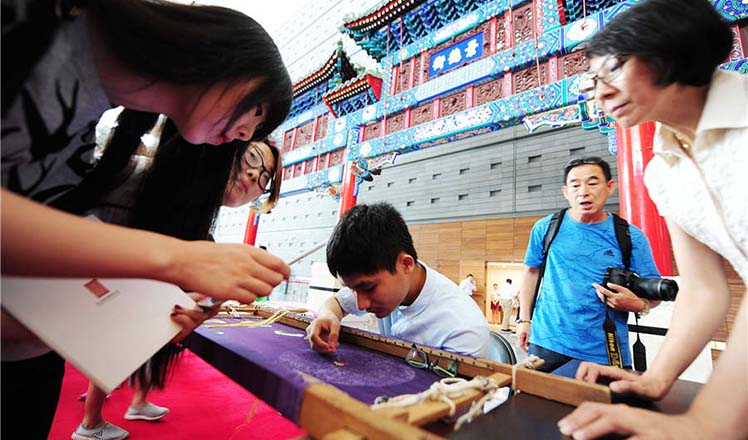
 Beijing's museum brings spirit of craftsmen alive
Beijing's museum brings spirit of craftsmen alive
 Phelps adds Olympic gold medal haul to historic 21
Phelps adds Olympic gold medal haul to historic 21
 Weightlifter Deng Wei breaks world records
Weightlifter Deng Wei breaks world records
 Top swimmer Sun Yang makes sweet revenge
Top swimmer Sun Yang makes sweet revenge
 Lin Yue and Chen Aisen win Olympic gold medal
Lin Yue and Chen Aisen win Olympic gold medal
 Artist creates mini-mes for loving couples at Qixi festival
Artist creates mini-mes for loving couples at Qixi festival
 Skyscraper demolished outside ancient city
Skyscraper demolished outside ancient city
Most Viewed
Editor's Picks

|

|

|

|

|

|
Today's Top News
Phelps puts spotlight on cupping
US launches airstrikes against IS targets in Libya's Sirte
Ministry slams US-Korean THAAD deployment
Two police officers shot at protest in Dallas
Abe's blame game reveals his policies failing to get results
Ending wildlife trafficking must be policy priority in Asia
Effects of supply-side reform take time to be seen
Chinese State Councilor Yang Jiechi to meet Kerry
US Weekly

|

|
